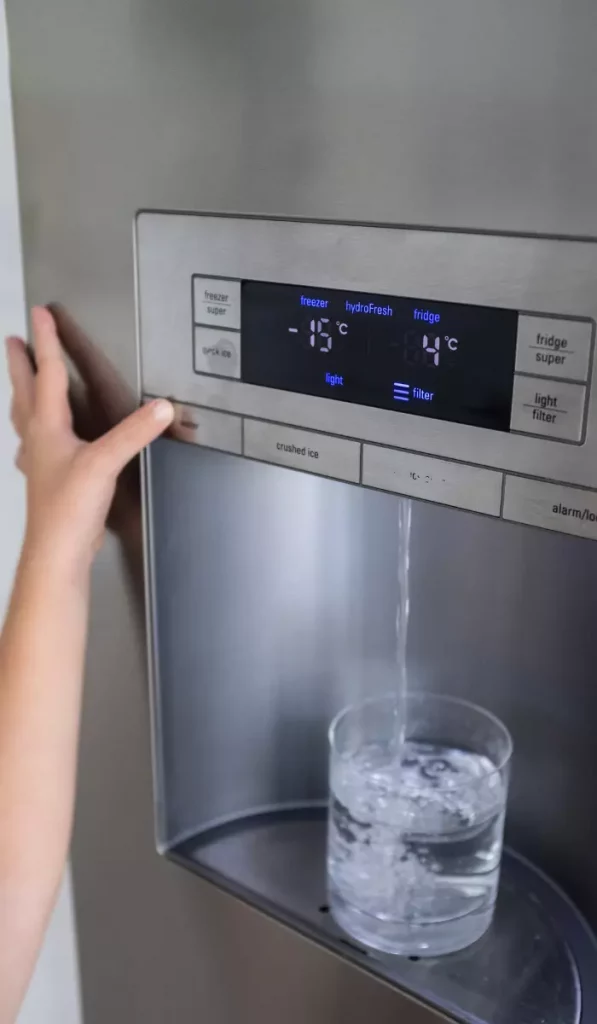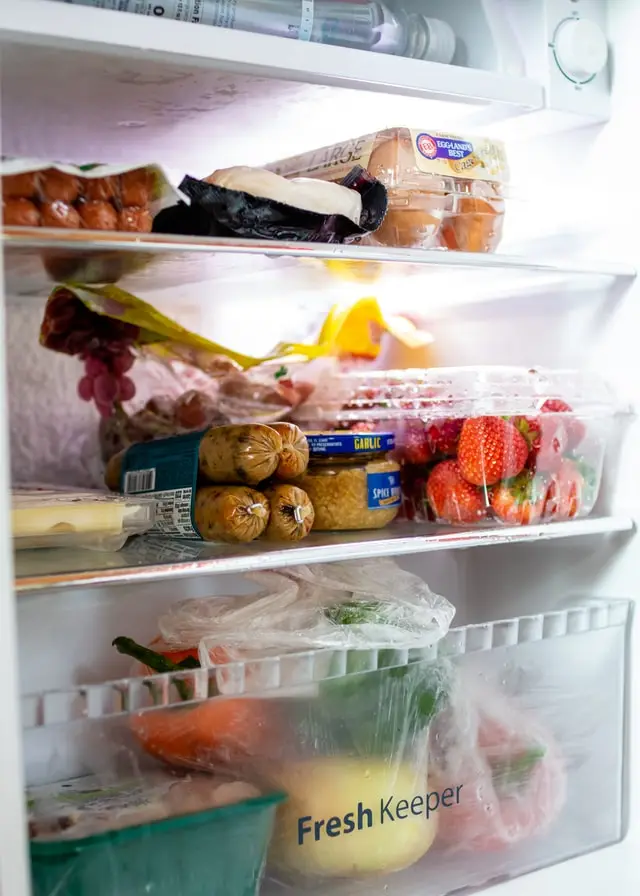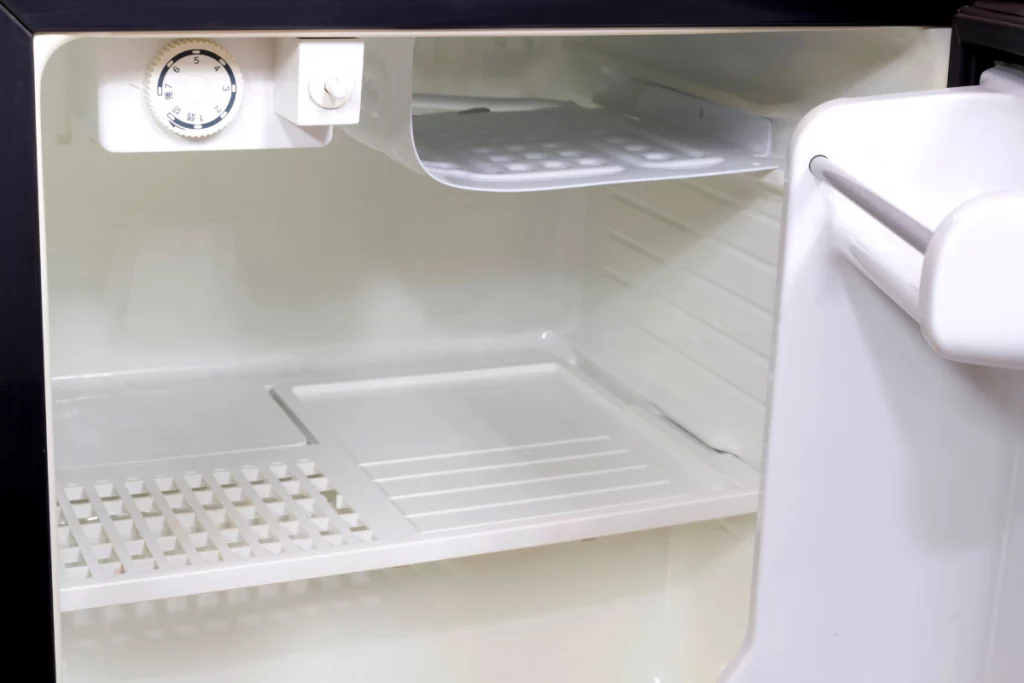Have you ever wondered where fridge water comes from? Most people enjoy a glass of cold fridge water but haven’t thought about where the water actually comes from and the process that it goes through.
In fact, many will be surprised to learn that the source of their fridge water is the same as that of tap water, except that in this case, it’s filtered by your fridge filter and is of course, a lot colder.
Is Fridge water filtered tap water?
Yes, fridge water is filtered tap water. Fridge water comes from the main supply lines that feed your home with water.

A pipe connects the water to the refrigerator filter and into your water dispenser. Fridge water has the advantage of being cooler than tap water, and some refrigerators also make ice with filtered water. Tap water often has a lot of chlorine, but it quickly evaporates when left to sit uncovered.
However, it is important to check and replace your refrigerator filter often, as indicated by the manufacturer. The type of filter used also determines the quality of the filtered water.
Check to see the stated micron rating for your fridge’s filter. The smaller the micron rating, the higher the rate of the filter.
Is tap water healthier than fridge water?
This is a great question that is usually up for debate. However, the answer solely depends on your location. Most water supplies in large municipalities undergo various intense filtration procedures to remove any harmful bacteria, viruses, and water hardness.
The water is then tested at water treatment plants to determine that it meets set standards before being released into homes. Therefore tap water should be safe for drinking without any risk to your health.

In areas where the piping is old and prone to lead contamination or limited water processing plants, tap water is not safe. You should probably take precautionary measures before drinking that water.
Most refrigerators have an activated carbon filter that traps impurities and removes contaminants from your drinking water. However, its main purpose is primarily remove the taste of chlorine and improve water taste.
Bottled water vs. water from refrigerator filters
Today’s on-the-go lifestyle calls for easy-to-pick water bottles. Because of the ease and convenience of carrying water, many people prefer bottled water compared to refrigerator filtered water. They also think that it is safer. However, research studies have indicated that this may not be necessarily so.
Although bottled water manufacturing is governed and regulated by the food and drug administration (US FDA) guidelines, the regulations are less strict than those regarding tap water.
There are many bottled water types; spring water, purified water, mineral water, sparkling, artesian, and well water. Bottled water undergoes a filtration process and a purification system. Even though some people prefer bottled water, it is a pricier option an dofcurse costs significantly more per liter.
Using refrigerated filtered water is a green, sustainable option that is better for us all and better for the environment. Millions of plastic bottles disposed off end up in landfills, and water bodies and often pose a risk to human and marine health. If people choose to switch from bottled water to fridge water, then plastic pollution is reduced each year.

How long is refrigerated tap water good for?
Sometimes, the water supply may be disrupted, and there is a need to store water for extended periods of time. However, the big question is, how long can you store the water for?
In theory, water should not go bad and could be stored indefinitely. Additionally, refrigeration also helps reduce the risk of bacterial growth and prolongs the shelf life of your water. If sealed in a clean container, it could theoretically last forever, however the folks over at hunker.com recommend disposing off refrigerated tap water after a period of six months.
It is essential to store your water in a clean, closed container to prevent the risk of impurities or contamination. If you find that the water has a bad smell, do not consume it. It might be contaminated even though it looks safe for drinking.
How exactly does a refrigerator water filter work?
Different refrigerators will usually have different filters depending on the manufacturer’s choice and design. Various filters will sieve out multiple contaminants, such as bacteria, heavy metals, and large soil particles.
Some filters target and remove any oversized particles like dirt, silt, and soil that may have made their way through the water pipes while others target more extensive traces of chlorine that affect the water’s taste.
Additionally, another option of filters usually contain a carbon filter that gets rid of microscopic contaminants. It should be noted that it is possible to have a refrigerator filtration system that can accommodate all these options where the water goes through a series of filtration stages.
Ofcourse, the water might taste different after going through all these processes.
How clean is the water from your fridge dispenser?
The first variable to consider will be the water source feeding into the refrigerator’s filter and reservoir. Consider the type of pipe that is connecting water to your refrigerator. Some people will use copper pipes, while others will choose plastic hosepipes. Remember to flush the lines to ensure no sediments are locked in there.
The second variable is how regularly you clean the fridge water dispenser. Infrequent cleaning of the dispenser will not only increase likelihood of bacteria may accumulating at the dispenser point but might also change the taste of the water.
Remeber to regularly clean your water dispenser with clean water and some vinegar/bleach or using an alternative agent.

Conclusion
Fridge water is a popular alternative to tap water, filtering pitchers and bottled water. It saves money compared to buying bottled water and is a sustainable option for you and your family.
It is important though to regularly clean/change your dispensers, filters and pipes that supply water to and from your refrigerator in order to maintain the cleanliness and purity of your fridge water.




